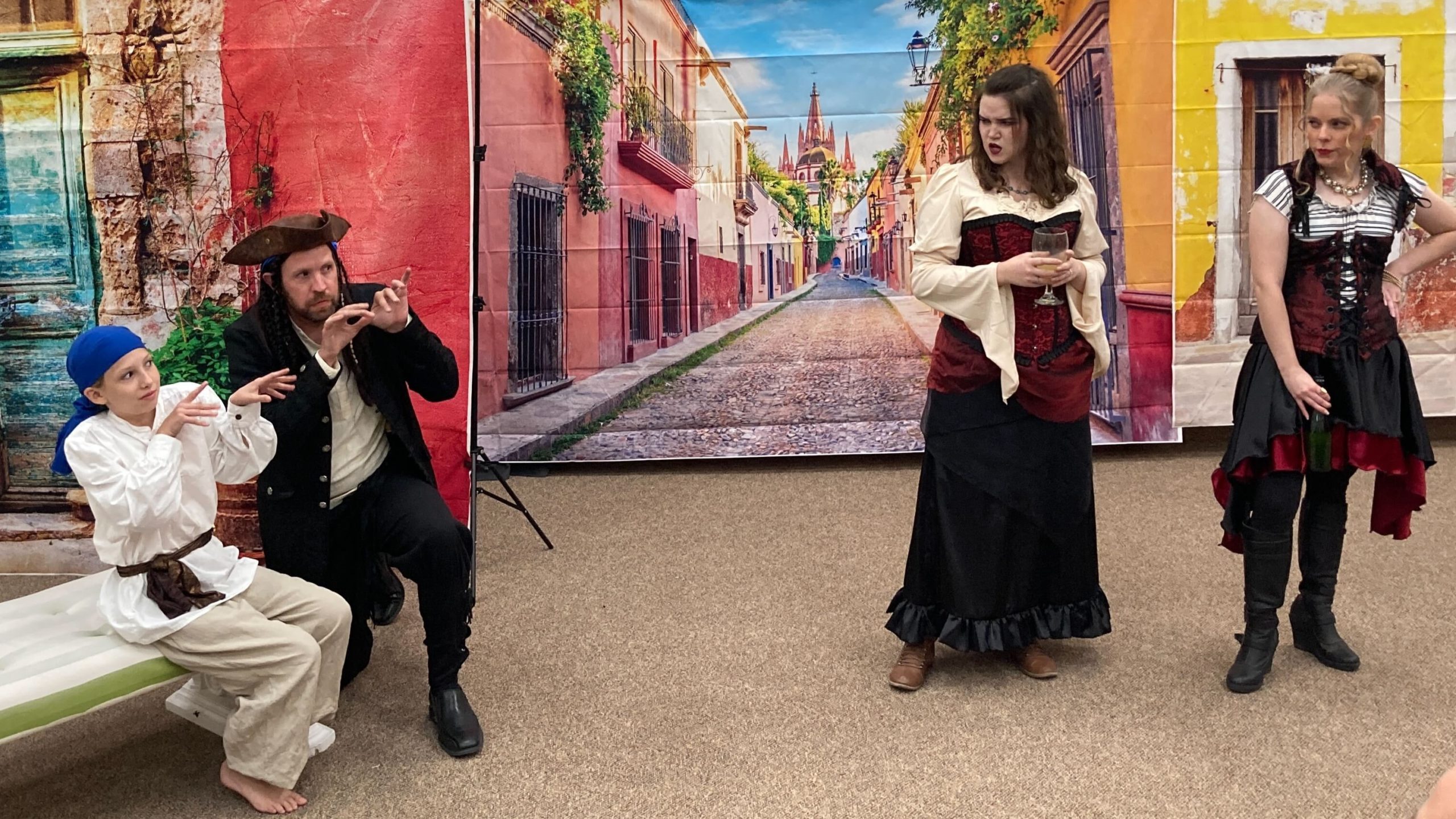EAGLE MOUNTAIN — Something interesting happens whenever a critical mass of Utahns get together: they put on a play. Less than three years after the establishment of Salt Lake City, the settlers were mounting plays, and today even some of the state’s smallest towns can boast a local theatre company. Eagle Mountain Community Theatre is keeping this tradition alive. This little company on the western outskirts of Utah County has a new production of The Comedy of Errors that is infused with the can-do spirit that generations of theatre lovers would recognize.
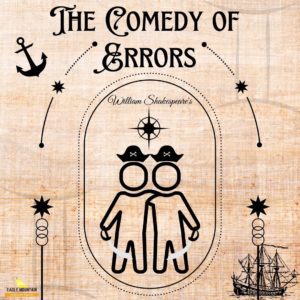
Before the action of The Comedy of Errors begins, a shipwreck separates two identical twin brothers so that the father ends up with one son in Ephesus and the mother with another in Syracuse. Also separated are another set of identical twin boys, with each one ending up with a member of the other twin pair and raised to be a servant of the other twin. When the play begins, the Syracuse pair — Antipholus and his servant Dromio — visit Ephesus. Unbeknownst to them, the men’s brothers in Ephesus are also called Antipholus and Dromio. Inevitably, confusion arises as each man is mistaken for his long lost brother.
The show is an excellent selection for the company. The Comedy of Errors is Shakespeare‘s shortest play, and the play lacks the deep psychological explorations, complex character development, advanced stage craft, and political drama seen in many of his other works. Because Shakespeare’s only goal was to make people laugh, amateur actors do not need to create nuanced performances to succeed in their roles. Moreover, Eagle Mountain Community Theater had a venue that is the right size for their show: the choir room at Frontier Middle School. The space can seat about 100 people, and on opening night the seats were about 80% full. It was not a glamorous setting for a play, but the stage was the perfect size for the cast of 17 — neither cramped nor too open.
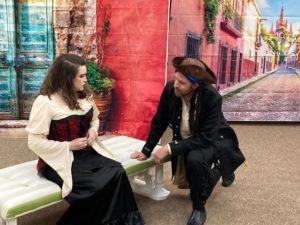
Director Nate Jenson made some adjustments to the script, including cutting it down, gender switching some supporting roles, and setting the action in Tortuga instead of Ephesus. Jenson also gave the play a pirate setting because . . . why not? The goal of any production of The Comedy of Errors is to create a night of fun, and it must be a blast for the actors to dress like a pirate and recite Shakespeare. Jenson was effective at getting his cast to clearly speak the text; every single member of this cast enunciated their lines well and seemed to understand what their characters were saying and why. Jenson also communicated the story well with effective actions that matched the meaning and tone of the script.
Yet, I wish there had been more effort from Jenson to get his actors to connect with one another on stage. Often they seemed to be speaking their lines at each other, instead of having meaningful conversations. If Jenson’s actors could stay focused on one another and not wander aimlessly around the stage, this cast could raise the caliber of their performances. I know this because there were a few scenes when they did exactly that, most notably when Antipholus of Syracuse professes his love for Luciana, or when the two Dromios finally meet. These scenes were satisfying to watch because the characters briefly formed genuine connections with one another.
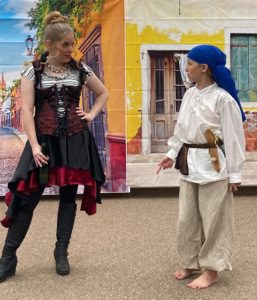
Also, I found some of the directing too subdued. The show maintained a steady level of energy, but what audiences want in a farce is for the zaniness and energy to build until the play’s climax. Still, the show clocks in at just 90 minutes, and the pacing never slacks.
Scott Hales stars as Antipholus of Syracuse. Hales is comfortable in the role, whether he is bossing around Dromio or expressing bewilderment at the latest case of mistaken identity. Tyler Allred plays Antipholus of Tortuga as a gruffer version of Jack Sparrow. Allred stomps around the stage, and his character’s proud demeanor makes his later imprisonment and humiliation enjoyable. The biggest drawback is that Hales and Allred are not convincing as twins, especially because they share few mannerisms and Allred has a hoarser acting voice.
Lucy Pope and Anna Stoddard play Dromio of Tortuga and Dromio of Syracuse, respectively. I estimate that they are about 12 years old, and the director shows a lot of trust by casting such young performers in these roles. Pope and Stoddard play their characters well, and they were just as good as the adults at getting the audience to laugh.
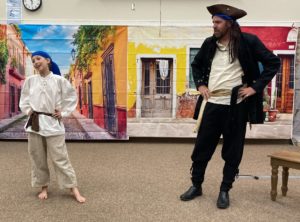
I also enjoyed Meg McCoy-Reitz as Luciana. The sophisticated way she could do something as simple as hold a wine glass in her first scene showed that McCoy-Ruiz could capitalize on a simple prop to develop her character. Emma Faye as Adriana is a charming presence, and her character’s distress when she believes her husband (Antipholus of Tortuga) is crazy is one of the most realistic moments in a very unrealistic play.
The most notable technical aspect of the play is the costumes by Brittani Harris and Mirinda Call. The pirate costumes have a Halloween feel, but that is just part of the fun. The women wear corsets and long skirts, while the men wear boots, tunics, and sashes or belts around their waists. Most importantly, the costumers distinguished the Dromios and Antipholi with a red headkerchief for the Tortuga natives and a blue headkerchief for the Syracusans. This was a helpful visual clue that even my 8-year-old son could use to understand which twin was on stage at any time.
The other technical components were either minimal or missing. The lighting came from the overhead fluorescent lights (convenient for a critic taking notes), and the set was large printed photos tacked up on the wall or clipped to nearby stands. Flashy? No. But it is enough. After all, when Shakespeare wrote this play, his theater did not use large set pieces, and most performances would be outdoors, lit only by the sun. The producers were correct to focus on the costuming in this show.
The Eagle Mountain Community Theatre production of The Comedy of Errors looks and feels like a bunch of friends said, “Let’s put on a play!” And with a lot of hard work, they did. Not only that, but they met all their goals: making the audience laugh, building appreciation for Shakespeare, and having fun on stage. This production is part of a Utah tradition dating back over 170 years of creating theatre and nurturing the fine arts, and I hope that their town appreciates their efforts.
[box]The Eagle Mountain Community Theatre production of The Comedy of Errors plays Saturdays and Mondays through September 12 at Frontier Middle School (1427 Mid Valley Road, Eagle Mountain). Tickets are $10-12. For more information, visit emctheatre.com.[/box]
